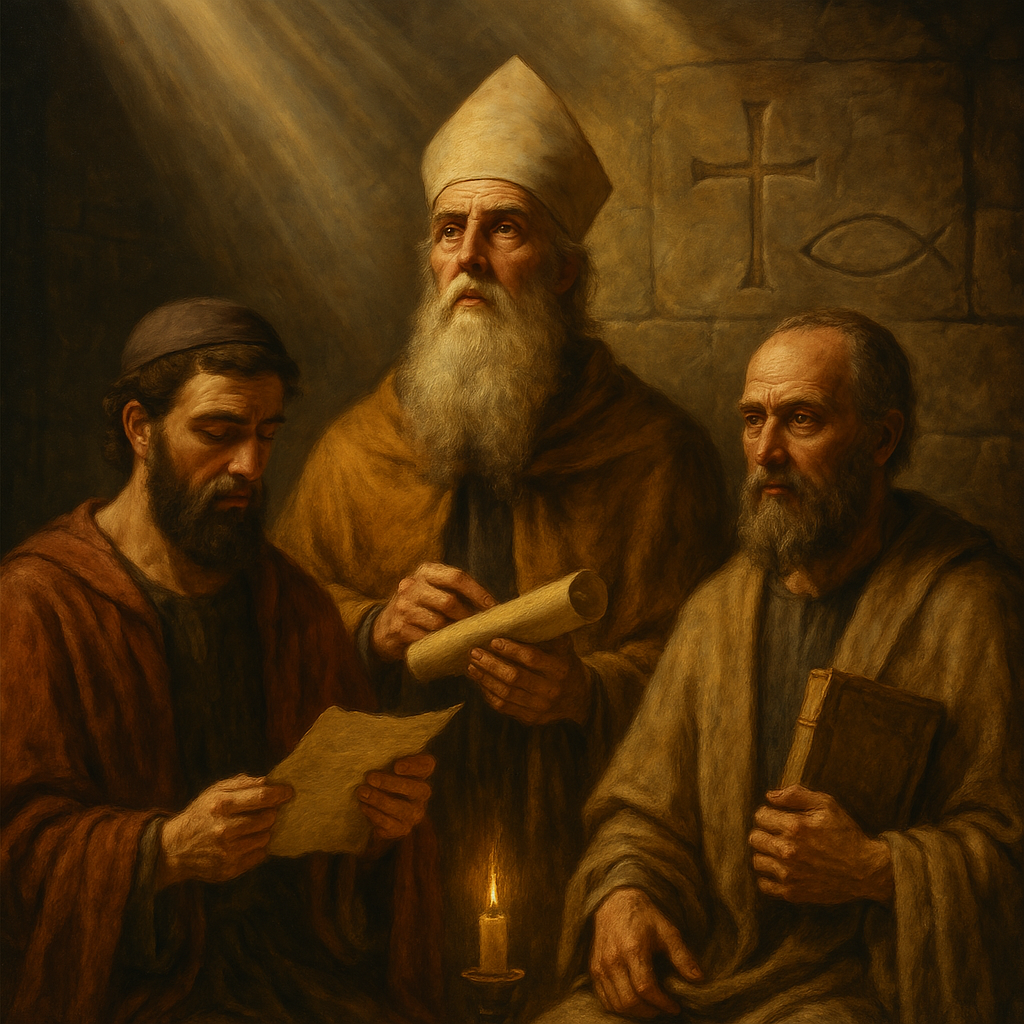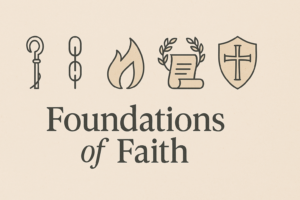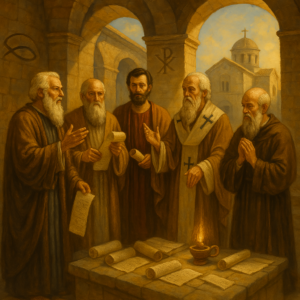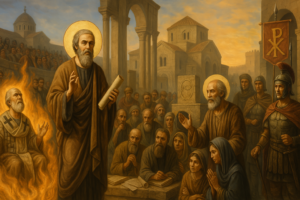
Estimated reading time: 12 minutes
Key Takeaways
- The early church fathers were instrumental in shaping core Christian doctrines and practices.
- Their writings preserved apostolic tradition and defended against heresies.
- Key figures include Ignatius of Antioch, St Justin Martyr, and Irenaeus of Lyons.
- They contributed to the formation of doctrines like the Trinity and the resurrection.
- Understanding their work provides insight into early Christianity’s development.
The early church fathers were instrumental in shaping the doctrines and practices that have defined Christianity for centuries. From the late 1st century through the 8th century, these influential theologians and leaders established core Christian teachings, interpreted scriptures, and defended the faith against various heresies. Their connection to the apostles and preservation of apostolic tradition cemented their crucial role in Christianity’s development.
This post explores the writings, teachings, and historical significance of the early church fathers. We’ll examine key figures like Ignatius of Antioch, St Justin Martyr, and Irenaeus, along with their contributions to fundamental Christian doctrines such as the Trinity and resurrection. Understanding these early Christian writings provides invaluable insight into how Christianity took shape in its formative years.
Historical Context of the Early Church Fathers
Early Church Period
The early church fathers emerged during the critical transition from the apostolic age (first century AD) to the early medieval period. As the original apostles passed away, these leaders stepped forward to guide the growing Christian community and preserve apostolic teachings during a time of significant challenges.
The historical timeline spans roughly from the end of the first century through the eighth century, covering a period of rapid transformation for the Christian faith. During this time, Christianity evolved from a persecuted minority sect into an increasingly organized religion with established doctrines and practices.
Apostolic Fathers vs. Apostolic Church Fathers
Apostolic Fathers
The apostolic fathers were those who had direct contact with the apostles or their immediate disciples. This proximity to the original followers of Jesus gave their writings special significance. Key apostolic fathers include:
- Clement of Rome: Considered the fourth pope and author of an important epistle to the Corinthians
- Ignatius of Antioch: Bishop of Antioch who wrote several letters while en route to his martyrdom
- Polycarp of Smyrna: Bishop and martyr who studied directly under the Apostle John
Their writings provide the earliest non-biblical Christian documents and offer crucial insights into early Christian communities and practices.
Apostolic Church Fathers
The term “apostolic church fathers” is sometimes used interchangeably with “apostolic fathers,” but can also refer more broadly to early leaders who upheld apostolic teachings without necessarily having direct contact with the apostles themselves. These leaders maintained the continuity of apostolic tradition through their teachings and pastoral leadership.
Learn more about them at Theopedia: Early Church Fathers.
Formation of Christian Doctrine
The early church fathers played a decisive role in the formation of Christian doctrine. They carefully articulated beliefs about:
- The nature of Christ
- The concept of salvation
- The structure of the church
- The interpretation of scripture
This formation of Christian doctrine occurred during intense periods of both external persecution and internal theological disputes. The fathers sought to maintain unity while establishing clear boundaries between orthodox Christianity and competing views.
Discover why they are important at Catholic Clutch.
Defense Against Heresies
One of the most crucial contributions of the early church fathers was their defense against various heresies threatening the early church. They wrote extensive refutations against movements like:
- Gnosticism: Which claimed special secret knowledge and rejected the physical world
- Arianism: Which denied the full divinity of Christ
- Docetism: Which claimed Jesus only appeared to have a physical body
Irenaeus particularly distinguished himself through his work “Against Heresies,” systematically refuting Gnostic teachings and affirming orthodox Christian beliefs. Later, the Council of Nicea would provide an important defense of Christ’s divinity against Arian teachings.
More details can be found at FreedomGPT: Early Church Fathers.
Key Early Church Fathers and Their Writings
Ignatius of Antioch
Biography
Saint Ignatius of Antioch served as the third bishop of Antioch in Syria during the early second century. According to tradition, he was a disciple of the Apostle John. Arrested for his Christian faith during the reign of Emperor Trajan, Ignatius was transported to Rome for execution.
Writings
Ignatius’s writings consist of seven authentic letters written while traveling to Rome for his execution:
- Letter to the Ephesians
- Letter to the Magnesians
- Letter to the Trallians
- Letter to the Romans
- Letter to the Philadelphians
- Letter to the Smyrneans
- Letter to Polycarp
Themes in His Writings
Major themes in Ignatius’s letters include:
- Church Unity: Emphasizing the importance of obedience to bishops as representatives of God’s authority
- Warnings Against Heresies: Particularly against Docetism, which denied Jesus’ physical body
- Christ’s Incarnation and Resurrection: Affirming the reality of Jesus having a physical body, suffering, and bodily resurrection
Ignatius wrote powerfully about the resurrection, stating: He was truly raised from the dead, His Father having raised Him, as in the same manner His Father will raise up in Christ Jesus us who believe in Him.
Read more at Early Christian Writings.
Significance
Ignatius made profound contributions to early Christian ecclesiology, particularly in establishing the hierarchical structure of bishop, presbyters, and deacons. His insistence that the Eucharist must be celebrated under the bishop’s authority helped shape early Christian worship practices. His writings represent an important bridge between apostolic Christianity and later institutional developments.
St Justin Martyr
Biography
St Justin Martyr (100-165 AD) stands as one of Christianity’s earliest and most important apologists. Born in Flavia Neapolis (modern-day Nablus) in Samaria, Justin received extensive education in Greek philosophy before converting to Christianity as an adult. After his conversion, he continued wearing his philosopher’s robe while teaching Christian philosophy in Rome.
Writings
Justin Martyr’s writings include three major works that have survived:
- First Apology: Addressed to Emperor Antoninus Pius, defending Christians against persecution and explaining Christian beliefs and practices
- Second Apology: A shorter work continuing his defense of Christians
- Dialogue with Trypho: A record of Justin’s debate with a Jewish scholar, defending Christianity as the true fulfillment of Jewish prophecy
Themes
Key themes in Justin’s works include:
- Christianity as the True Philosophy: Arguing that Christianity fulfills what Greek philosophy sought
- Old Testament Prophecies about Christ: Demonstrating how Jesus fulfilled Jewish prophecies
- Defense of Christian Morality: Countering accusations of immorality by describing the virtuous lives of Christians
- Description of Early Christian Worship: Including valuable accounts of baptism and Eucharist practices
Justin’s execution in Rome around 165 AD earned him the title “Martyr,” highlighting his ultimate sacrifice for the faith he defended intellectually.
Discover his writings at New Advent: Church Fathers.
Irenaeus of Lyons
Biography
Irenaeus (130-202 AD) served as Bishop of Lugdunum (modern-day Lyon, France) and stands as a crucial theological bridge between the apostolic age and later Christian development. As a young man, Irenaeus studied under Polycarp, who had been a disciple of the Apostle John, creating a direct line to apostolic teaching.
Major Work: Against Heresies
Irenaeus’s most significant contribution is his five-volume work “Against Heresies” (Adversus Haereses), written to counter Gnosticism, particularly the teachings of Valentinus. This comprehensive refutation:
- Exposed and described Gnostic beliefs in detail
- Defended the unity of God as both Creator and Redeemer
- Affirmed the reality of Christ’s incarnation and physical resurrection
- Established the authority of apostolic tradition and episcopal succession
- Defended the four canonical gospels against Gnostic alternatives
“Irenaeus Against Heresies” represents one of Christianity’s most important early theological works, systematically articulating orthodox Christian beliefs against competing interpretations.
Learn more at Bible Study Tools: Early Church Fathers.
Key Contributions
Irenaeus made several enduring theological contributions including:
- Recapitulation Theory: Teaching that Christ recapitulated (or summed up) all humanity in himself to reverse Adam’s fall
- Rule of Faith: Articulating core Christian beliefs that became foundational for later creeds
- Canon of Scripture: Helping establish which writings were considered authoritative
- Apostolic Succession: Emphasizing the importance of bishops as guardians of apostolic teaching
His beliefs helped systematize Christian theology in its formative period, particularly regarding salvation history and Christology.
Other Writings
Beyond “Against Heresies,” Irenaeus wrote “Proof of the Apostolic Preaching,” a catechetical work outlining Christian doctrine in a more positive, instructional manner. This work was lost for centuries until discovered in an Armenian translation in 1904, providing valuable insights into early Christian teaching methods.
Explore more at Introduction to the Early Church Fathers.
Teachings and Doctrinal Contributions
Early Church Fathers on the Trinity
Development of the Doctrine
The doctrine of the Trinity—one God in three persons—developed gradually through the writings of the early church fathers. While not fully articulated until the fourth century, important groundwork was laid by earlier fathers:
- Tertullian introduced terminology of “trinity” (trinitas) and formulated “one substance in three persons”
- Origen explored the eternal generation of the Son from the Father
- Athanasius defended Christ’s full divinity against Arian challenges
These incremental developments show the formation of Christian doctrine through careful reflection on scripture and apostolic tradition.
Key Concepts
The early church fathers established several key theological concepts that remain central to Christian understanding:
- Consubstantiality: The Father, Son, and Holy Spirit share one divine substance
- Distinct Personhood: Each member of the Trinity possesses distinct personhood
- Eternal Relations: The generation of the Son and procession of the Spirit are eternal, not created in time
- Economic Trinity: Each person has distinct roles in salvation history while maintaining unity of divine action
These sophisticated theological distinctions helped resolve apparent contradictions between monotheism and the worship of Jesus Christ.
Find out more at Theopedia: Early Church Fathers.
Impact on Nicene Creed
The theological work of the early fathers directly shaped the Nicene Creed (325 AD, revised 381 AD), which remains Christianity’s most widely accepted statement of faith. The Nicene Creed’s significance lies in its precise Trinitarian language, particularly the word “homoousios” (of the same substance) to describe Christ’s relationship to the Father—directly countering Arianism’s claim that Christ was a created being.
Learn about its significance at FreedomGPT: Early Church Fathers.



